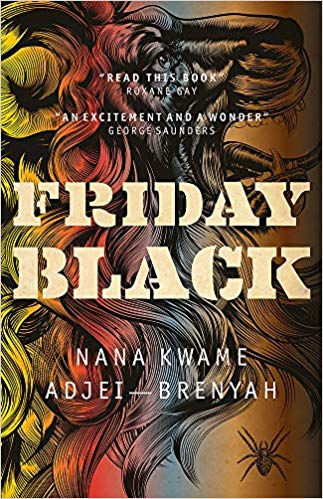In the run up to the announcement of the winner of this year’s International Dylan Thomas Prize, Wales Arts Review will be publishing reviews of the six shortlisted titles, written by the students of the IDTPrize module at Swansea University. Next up is Danni Scott’s review of Nana Kwame Adjei-Brenyah’s Friday Black (Houghton Mifflin Harcourt).
The module is the first English academic study in the world dedicated to a major literally prize and includes access for the students to authors and members of the publishing industry who run tutorials on subjects ranging from book marketing and publicity, to book prize logistics and sales in publishing to help students to explore how literary prizes help to produce, promote and celebrate contemporary writing.
 Nana Kwame Adjei-Brenyah’s Friday Black does not ease its reader in. From race issues in America to capitalism, this debut collection of short stories packs a punch.
Nana Kwame Adjei-Brenyah’s Friday Black does not ease its reader in. From race issues in America to capitalism, this debut collection of short stories packs a punch.
You are thrown into the first story in the collection, “The Finkelstein 5” which focuses on the aftermath of an incident in which five black children are decapitated by a white man with a chainsaw. We follow our narrator Emmanuel as he navigates life in this very familiar world of heightened racial tensions. Emmanuel’s self-dictated ‘blackness scale’ works as an innovative and fascinating way of vocalising a real issue faced by people of colour across the world. The ending, in which the scale fades to ‘nothing’, is utterly gripping and pushes the reader to consider their own views of race. Adjei-Brenyah’s writing shines through the horror beautifully. But this is not some dystopian future or a forgotten past. “The Finkelstein 5” is an example of an extremely common situation. The placement of a chainsaw in lieu of a gun reignites the reader’s shock, making a clear point about societies desensitisation toward gun violence.
During an interview with Seth Meyers, Adjei-Brenyah said jokingly that he is drawn to the short story format because he likes “how short they are”. This tightness and attention to detail works perfectly in Friday Black, making the collection deeply evocative whilst retaining its power. Using a variety of genres such as dystopian fiction, magical realism and folklore adds variety and colour to the text. Every story is completely different. Each story is given its own flavour, which makes the entire collection utterly unforgettable.
Particularly memorable are the stories surrounding the horrors of retail, such as the titular ‘Friday Black’ or ‘How to Sell a Jacket as Told by the Ice King’. They paint a bleak portrait of a future where capitalism has turned the consumer into a rabid animal. The intensity of the opening page of ‘Friday Black’ mirrors scenes often seen on television, the absolute chaos ushered in by the promise of a discount. Whilst these stories are routed in a recognisable reality there is a touch of the supernatural too. The consumer becomes a horrendous zombie-like creature with all traces of humanity having fallen by the wayside in an all-consuming need to save money. Becoming so ravenous that they have lost the majority of language and one must be bitten in order to understand them. Whilst the premise of the tale is clearly terrifying there is also a sense of humour, mocking these horrific creatures and warning the reader not to become one. Adjei-Brenyah, having worked in retail, expresses an instantly recognisable but deeply twisted version of consumer culture that both terrifies and entertains.
The collection has elements of Black Mirror in its propensity for taking something familiar and pushing it into the realm of the fantastical. Every dystopian tale within the collection is a distinct possibility, from the inferred atomic bomb of ‘Through the Flash’ to the genetically modified children of ‘The Era’. Whilst the race centric narratives, such as the futuristic theme park ‘Zimmer Land’ and the aforementioned ‘The Finkelstein 5’ are born of all too real racial issues facing America today. That being said, the collection does not feel like it will become obsolete in a few years. If history has proved nothing it has shown that technological advances and the struggle for equality will always be a topic that readers can connect to.
Friday Black taps into a very real fear. Many of the experiences, though they are hyperbolized, feel universal. Nana Kwame Adjei-Breynah has not only written an exciting, intelligent and politically engaged collection of stories, he has exposed our cultural flaws and asks the reader what they are going to do about it.










